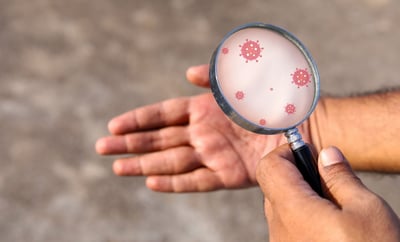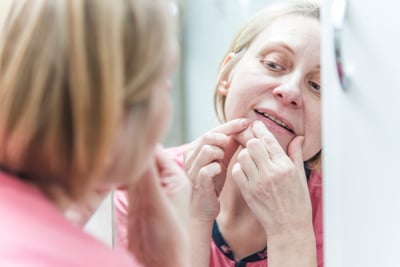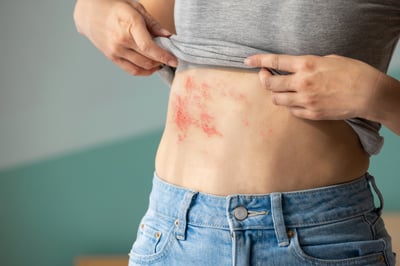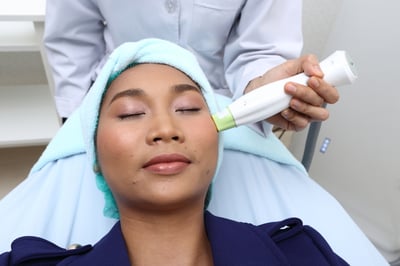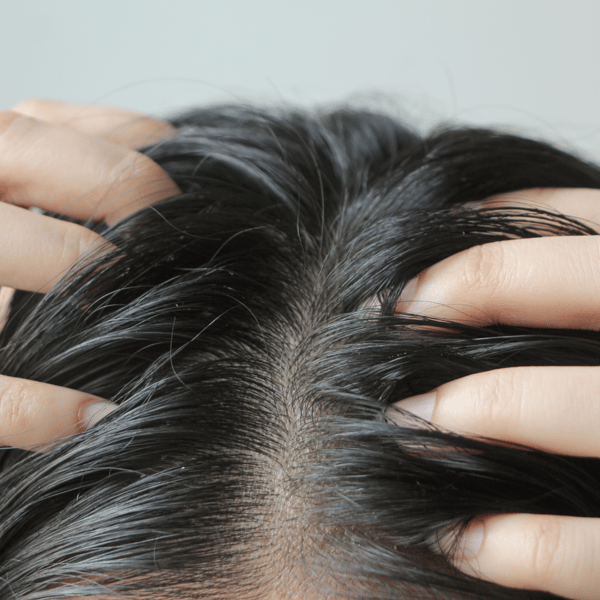
The relentless scratching, the prickly tickle and tingle, the constant annoyance and aggravation. When your scalp is the source of intense and relentless irritation, scratching just doesn’t cut it. To make matters worse, finding the cause of all that itching can be…well, a real head-scratcher.
More than just a minor annoyance, an itchy scalp can be a symptom of many different underlying dermatological conditions, including dandruff, psoriasis, eczema, lice, or possibly an allergic reaction to hair products. By recognizing the common causes of itchy scalp, you can take the necessary steps to treat the problem and prevent further issues.
1. Dandruff
One of the most common causes of an itchy scalp is dandruff, those white or yellowish flakes of dead skin found throughout the hair and on the shoulders. In addition to the embarrassing visual evidence, dandruff also can cause an itchy scalp, which usually leads to more scratching and more irritation. While the itchiness is usually mild, it can become severe if the dandruff isn’t treated.
Dandruff itself can be a result of many different causes:
- Overgrowth of a yeast-like fungus, called Malassezia, that lives on the scalp
- Dry skin
- Oily skin
- Sensitivity to hair products
- Infrequent shampooing
Treatment: Most cases of dandruff can be treated with an over-the-counter anti-dandruff shampoo. Look for active ingredients like zinc pyrithione, selenium sulfide, ketoconazole and coal tar, all of which help reduce the amount of yeast on the scalp. Salicylic acid shampoos can also help remove the scale and reduce the amount of dead skin cells, which can also help reduce the itchiness. More severe cases may require medicated shampoos or topical steroids prescribed by your dermatologist. Looking for a home remedy? Try mixing equal parts apple cider vinegar and water and applying it to your scalp to help balance your scalp’s pH.
2. Allergic reaction to hair products
Your scalp could be trying to tell you it doesn’t like what you’re putting on it. The itchiness may be an allergic condition called contact dermatitis, which is often caused by hair dyes, especially those that include para-phenylenediamine (PPD). It could also be a reaction to a certain shampoo or conditioner.
Treatment: This usually comes down to a process of elimination: Switch out the products in question one by one to see if you get relief. If you’re not able to deduce the offender on your own, you may need to consult a dermatologist for specialized tests to determine the cause.
3. Lice
Not just confined to elementary schools, lice can quickly spread from person to person, especially among family members. These tiny, wingless parasitic insects (about the size of a sesame seed) live on the scalp, feed on human blood, and cause an itchy feeling all over your head. Lice also lay oval-shaped eggs, which can be found attached to hair shafts close to your scalp.
Treatment: The best attack is a combination of over-the-counter treatments that contain ingredients like permethrin or pyrethrin along with manually removing the bugs and the eggs with a fine-toothed lice comb. Be sure to also wash any infested clothing, sheets, blankets and hair accessories in hot water and dry on high heat. Anything that can’t be washed should be sealed in plastic bags for two weeks to kill the bugs.
4. Scabies
Lice aren’t the only bugs that can attack your scalp! Scabies is a contagious skin condition caused by tiny mites that burrow just under the surface of the scalp, which can cause intense itching (especially at night) and a pimple-like rash. The rash can present as red bumps, scales or even blisters.
Treatment: Sorry, no over-the-counter remedies for this one. See your dermatologist as soon as possible for a prescription treatment.
5. Scalp psoriasis
This chronic autoimmune skin condition causes rapid skin cell growth, which then leads to a buildup of thick, scaly patches on the skin. If you live with psoriasis, you have a 50% chance to develop a flare-up on your scalp. You can usually spot psoriasis by red patches of skin covered with silvery scales that are not only itchy but also sometimes painful.
Treatment: While there’s no cure, various treatments can help manage the symptoms of scalp psoriasis, including topical treatments, phototherapy and other medications. Work with your dermatologist to create the most effective treatment plan for you.
6. Eczema
Also known as atopic dermatitis, eczema is a chronic skin condition characterized by red, inflamed and itchy skin. On the scalp, it can result in intense itching, as well as redness, crusting, and dry, flaky skin (sometimes mistaken for dandruff).
Treatment: Mild, fragrance-free shampoos for sensitive skin may be helpful, but some people may require prescription shampoos that contain corticosteroids or other anti-inflammatory ingredients. Your dermatologist may also recommend products that moisturize the scalp.
Don’t ignore an itchy scalp
The truth is that an itchy scalp can have many possible causes, so if you’re unsure, always see your dermatologist.
At Forefront, we know that an itchy scalp can be a symptom of everything from an autoimmune disease to skin cancer. Always be on the safe side and consult with your local board-certified dermatologist to identify the root cause and create a treatment plan that’s right for you.
Maintaining scalp health is a vital aspect of overall wellness that’s often overlooked. Plus, prioritizing your scalp can both alleviate that uncomfortable itchiness and also promote healthier hair growth.
Solving the mystery of your itchy skin may be a head-scratcher, but there’s no relief quite like a healthy scalp!
